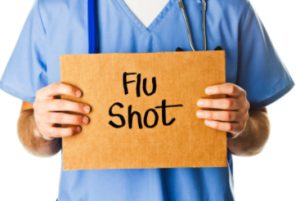This page is also available in:
![]() Français
Français
During the 2013-2014 flu season, approximately one-third of Canadians aged 12 and over protected themselves from the flu by getting a flu shot.
The flu vaccine is the best way to protect against the flu—statistics suggest that getting it can lower your chances of contracting the influenza virus by 50-60% when there is a good match between the vaccine and circulating flu viruses.
Still, many people don’t think getting the flu shot is necessary.
Among the two-thirds of Canadians who did not get the vaccine in 2013-2014, 56% said they felt it was unnecessary.
In fact, getting a flu shot is the best way to protect yourself from a serious illness. Though the flu may seem like a minor problem, it can be dangerous and even life-threatening for certain people.
If you have questions about the influenza vaccine and its side effects, read on to learn the answers.
How does the flu vaccine work?
The flu vaccine is a preventative treatment for the flu. It’s safe, effective, and your best line of defence when it comes to protecting you and your family from the seasonal influenza virus.
The vaccine helps your immune system to develop antibodies which will be able to fight selected strains of the flu virus. If you come into contact with the flu virus, these antibodies can protect you from infection.
The flu isn’t caused by a single virus. In fact, the influenza virus has many strains which are constantly changing. For this reason, the flu vaccine is updated every year to include strains of the virus that scientists believe will be common throughout the flu season. As a result, you need to get vaccinated each year to protect yourself.

Should I get the flu vaccine?
Chances are you’ve seen signs urging you to get the shot at your local pharmacy, doctor’s office, or clinic. Maybe you’ve also noticed ads at work or at your child’s school or local community centre.
So do you really need to get the shot?
The Government of Canada recommends all Canadians over the age of six months get the flu vaccine for a few simple reasons.
Firstly, the flu shot is the best way to protect yourself if you are exposed to the virus.
Even if you do get sick, the flu shot can help to reduce the duration and severity of the illness, meaning you’ll be able to get back to your everyday life sooner.
In addition, when you get the flu shot you’re helping to protect those around you—including your family members, co-workers, and friends—from getting sick. By getting vaccinated you are less likely to spread the virus to others.
People who are at an increased risk of developing complications from the flu are especially urged to get the flu shot. This includes individuals who:
- Have asthma
- Have diabetes
- Have heart or lung disease
- Are HIV positive
- Have cancer
- Have a suppressed immune system
- Are pregnant
- Are over the age of 65
- Are under the age of five
People who live with or care for people who fall into any of the categories above are also urged to get the flu shot—if not for themselves, then to protect those who are at risk.
In adults 65 years of age and older, there is a high-dose vaccination available in Canada that should provide superior protection compared with the standard dose vaccine.
Remember, you have to get the flu vaccine every year in order to stay protected.

Who shouldn’t get the flu vaccine?
Talk to your doctor or another healthcare provider about the risks of getting the flu vaccine. Infants under six months should not get the flu shot. People with a history of severe, life-threatening reactions to flu vaccines should also not get the flu shot.
People should speak to their doctors before getting the flu shot if they have a history of Gullain-Barre Syndrome, have an allergy to eggs, or are currently not feeling well.
When and where should I get the flu shot?
Flu activity peaks between November and March. The best time to get the flu shot is before the onset of flu season. It can take up to 2 weeks for antibodies to the flu to fully develop, so try to get the shot shortly after it is made available.
Free flu shot clinics are offered in October and November across Canada at universities, pharmacies, community centres, and public health clinics.
You can use this online tool to find a flu shot clinic in your province or territory. If you miss the flu shot clinics offered in your area, it’s not too late to get vaccinated. Make an appointment with your family doctor. Even a late flu shot is better than no flu shot at all.

What are the side effects?
The flu shot is safe and side effects are generally mild. You may feel tired, achy, or feverish after you get the shot. Some people notice tenderness, redness, and swelling at the injection site. These minor problems usually go away within a day or two.
Severe side effects are rare but can include severe allergic reactions and Gullain-Barre Syndrome. If severe effects occur, you may notice them within a few minutes or up to a few hours of getting the shot. It is a good idea to remain where you received the flu vaccine for 15 -30 minutes. That way if any immediate problems arise, a health care professional is nearby.
It is a good idea to remain where you received the flu vaccine for 15 -30 minutes. That way if any immediate problems arise, a health care professional is nearby.
Don’t wait to seek out emergency help if you think you are having a reaction. Call 911 right away if you experience difficulty breathing, feel weak or dizzy, experience a fast heartbeat, or develop hives.
To really understand the flu shot, see the article Is The Flu Shot Safe? Influenza Myths & Truths


